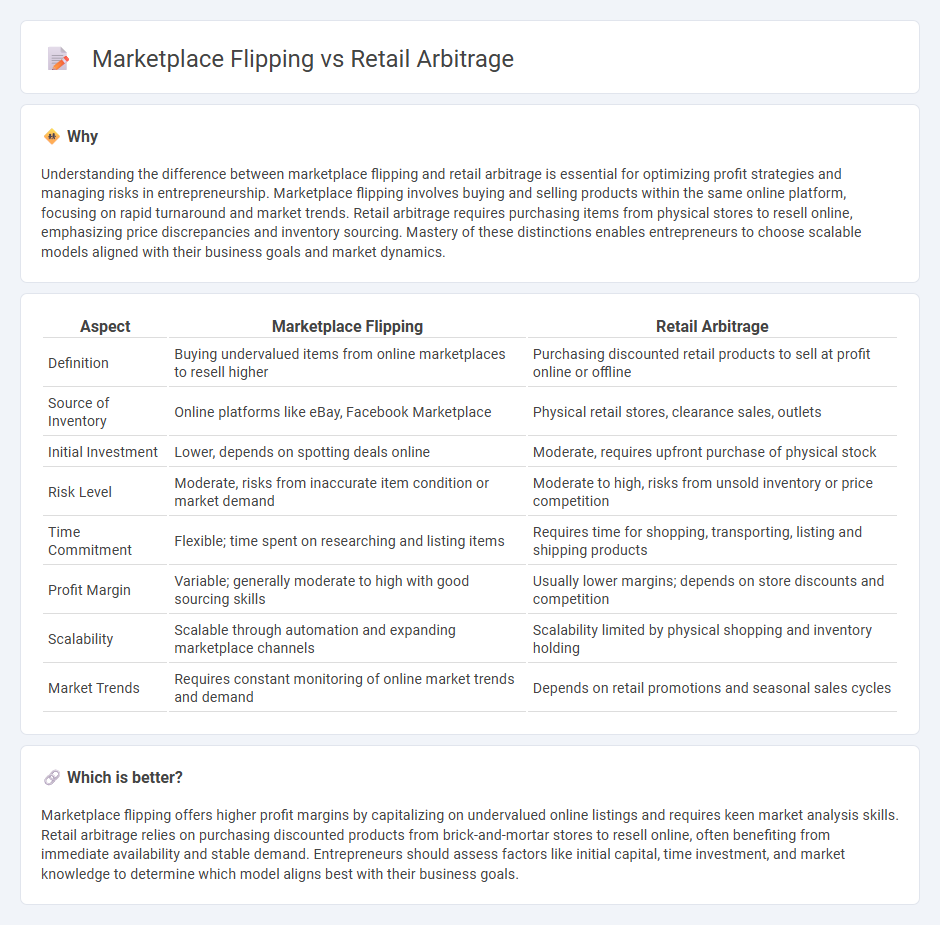
Marketplace flipping involves purchasing underpriced items from online platforms to resell at a profit, leveraging market inefficiencies and digital trends. Retail arbitrage focuses on buying clearance or discounted products from brick-and-mortar stores to sell on e-commerce sites like Amazon or eBay for a margin. Explore the nuances of each strategy to determine which entrepreneurial model best suits your goals.
Why it is important
Understanding the difference between marketplace flipping and retail arbitrage is essential for optimizing profit strategies and managing risks in entrepreneurship. Marketplace flipping involves buying and selling products within the same online platform, focusing on rapid turnaround and market trends. Retail arbitrage requires purchasing items from physical stores to resell online, emphasizing price discrepancies and inventory sourcing. Mastery of these distinctions enables entrepreneurs to choose scalable models aligned with their business goals and market dynamics.
Comparison Table
| Aspect | Marketplace Flipping | Retail Arbitrage |
|---|---|---|
| Definition | Buying undervalued items from online marketplaces to resell higher | Purchasing discounted retail products to sell at profit online or offline |
| Source of Inventory | Online platforms like eBay, Facebook Marketplace | Physical retail stores, clearance sales, outlets |
| Initial Investment | Lower, depends on spotting deals online | Moderate, requires upfront purchase of physical stock |
| Risk Level | Moderate, risks from inaccurate item condition or market demand | Moderate to high, risks from unsold inventory or price competition |
| Time Commitment | Flexible; time spent on researching and listing items | Requires time for shopping, transporting, listing and shipping products |
| Profit Margin | Variable; generally moderate to high with good sourcing skills | Usually lower margins; depends on store discounts and competition |
| Scalability | Scalable through automation and expanding marketplace channels | Scalability limited by physical shopping and inventory holding |
| Market Trends | Requires constant monitoring of online market trends and demand | Depends on retail promotions and seasonal sales cycles |
Which is better?
Marketplace flipping offers higher profit margins by capitalizing on undervalued online listings and requires keen market analysis skills. Retail arbitrage relies on purchasing discounted products from brick-and-mortar stores to resell online, often benefiting from immediate availability and stable demand. Entrepreneurs should assess factors like initial capital, time investment, and market knowledge to determine which model aligns best with their business goals.
Connection
Marketplace flipping and retail arbitrage both involve purchasing products at lower prices to sell them for profit, leveraging price discrepancies across different platforms. Entrepreneurs use retail arbitrage to source discounted or clearance items from retail stores, then apply marketplace flipping strategies by listing these products on online marketplaces like Amazon or eBay. This synergy maximizes profit margins and enables scalable business models within the e-commerce ecosystem.
Key Terms
Sourcing
Retail arbitrage involves sourcing discounted or clearance products from physical retail stores to resell at a higher price on online platforms like Amazon or eBay. Marketplace flipping centers on purchasing undervalued items directly from online marketplaces, then relisting them for profit. Discover more about the best sourcing strategies for maximizing your resale business.
Pricing Strategy
Retail arbitrage involves purchasing products at lower retail prices and reselling them at higher prices on different platforms, capitalizing on price discrepancies. Marketplace flipping requires acquiring undervalued items on online marketplaces, often through auction or clearance sales, and reselling them for a profit by optimizing pricing based on demand and competition. Explore advanced pricing strategies to maximize profits in both retail arbitrage and marketplace flipping.
Platform Policies
Retail arbitrage involves buying products from traditional retail stores and reselling them online, often on platforms like Amazon or eBay, which have strict guidelines on product authenticity and condition. Marketplace flipping focuses on purchasing undervalued items directly from online marketplaces to resell at a profit, frequently requiring adherence to platform-specific rules regarding listing accuracy and seller performance. Explore further to understand how compliance with platform policies can impact your reselling success and avoid account suspensions.
Source and External Links
A Complete Guide on Amazon Retail Arbitrage - Retail arbitrage is a business model where individuals buy products at lower prices from retail stores and resell them on platforms like Amazon or Walmart for a profit, leveraging price differences between markets to earn money.
Smash Retail Arbitrage on Amazon (2025 Guide) - Retail arbitrage involves purchasing products from one retailer and reselling them on another platform such as Amazon, Walmart, or eBay for a profit, with legality established under the first-sale doctrine in the US and UK.
Amazon Retail Arbitrage: How to Resell Products on ... - Retail arbitrage means buying products at a lower price from retailers like Walmart and reselling them on Amazon at a higher price; it is legal provided the items are sold in unchanged, new condition and it differs from other business models like private label or wholesale.
 dowidth.com
dowidth.com